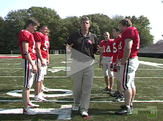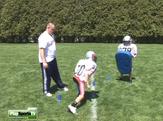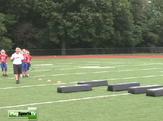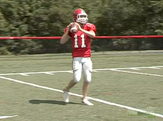Encourage Youth Football Players with Positive Feedback

Youth football coaches must encourage players to feel good about their contributions
By Marty Gitlin
Special to PlaySportsTV
Every player on a youth football team should feel he is an important part of the team’s success, even though they might not share the same abilities and talents.
Longtime and highly successful coach Russ Jacques of the Strongsville High School football team, in Strongsville, Ohio, fully believes this coaching strategy.
Jacques understands that for younger kids to have the desire to continue competing in football, they must feel good about themselves. And they can’t feel good about themselves with a football inferiority complex.
“A coach has to feel his way around that situation,” Jacques says. “But every kid has to get some positive feedback. If he’s not the best player physically, maybe he can be the kid who leads calisthenics or the kid who gets a little head start on a relay race and wins that. You want him to go home at the end of the day and tell his Dad, ‘Hey, Dad, I was the guy that led calisthenics today!’ You have to be positive.”
Make football drills stimulating and fun
Jacques believes the primary function of the youth football coach is to teach football fundamentals in an enjoyable way.
(A great way to coach the football fundamentals necessary to play quarterback is through PlaySportsTV's football training plan How to Play Quarterback. Here's one of over 40 drills: the Pitch technique.)
It’s all about blocking, tackling, catching and throwing. But players won’t learn these football fundamentals if they’re not having fun on the field. Most players' minds are prone to wandering through boring and repetitive drills.
“What you want to do is make it a competitive situation,” Jacques says. “Instead of running gassers, do a relay race. Bring it down to the level that will allow you to get your work done with the kids not even knowing it.
“Most people are competitive by nature and kids are no different. Don’t tell them they’ll be running gassers after practice. Tell them they’ll be running a relay race and they won’t even know they’re getting in shape.
“Kids who are 7 or 8 or 9 years old, all they want to do is play. But they have to know that to play the right way, and they have to learn the basic things. They want to do something for a short time and then do something else. You have to break your practices down into segments.”
Football coaching tip: Keep encouraging players
Jacques also stresses that even if all your players learn the basics, they are not all going to enjoy performing those specific tasks equally. He believes that coaches must be sensitive to the feelings of all his players.
In other words, everybody will learn how to tackle and how to be tackled safely, but while some younger kids will love the contact that is a necessity in football, others will shy away from it. That doesn’t mean they are doomed to play only non-contact sports. It just means they must be given time and encouragement.
“Some kids are going to love tackling and getting tackled and some kids are not,” Jacques says. “Some kids have to work up to wanting to hit somebody and wanting to get hit. But those are life lessons. In life, when you get knocked down, you have to get up. And that’s what they have to learn.”
The bottom line is that every youth football player must believe he is contributing to the team effort.
“You want every player to understand his role and look forward to every day,” he says. “As long as he feels like he’s contributing, that’s the most important thing.”
Story courtesy of Red Line Editorial, Inc.
###
Learn the best coaching techniques through PlaySportsTV football training plans.







